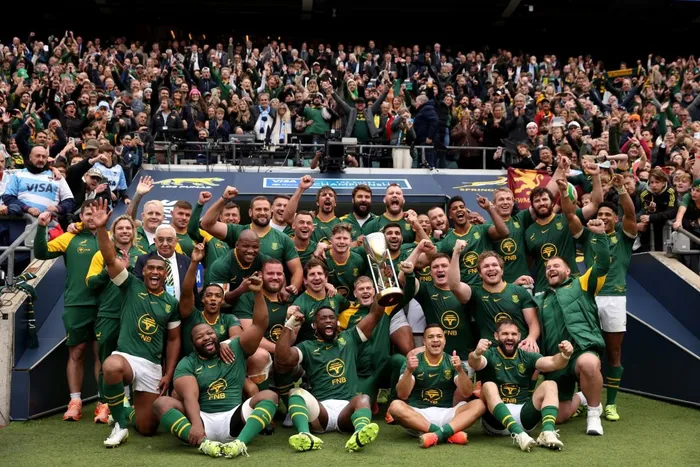
Springboks players celebrate their hard-fought 29-27 victory over Argentina at Twickenham. Photo: AFP
Image: AFP
When the Springboks play a Test match, there is always drama. They entertain; they have fans chewing their fingernails; and usually, they win as they continue to evolve under coach Rassie Erasmus. We look at five takeaways from the Boks’ 29-27 defeat of Argentina at Twickenham.
For the first time in the history of the game, a team (the Springboks) are holders of back to back World Cups, winners of a British and Irish Lions series, back to back winners of the Rugby Championship, the Freedom Cup (for beating New Zealand), the Nelson Mandela Plate (for beating Australia) and the Qatar Airways Cup (for beating the Barbarians).
That is a treasure trove of silverware amassed between 2019 and 2025, and only the All Blacks of 2010-2018 can rival it.
In defending the Rugby Championship for the first time, the Springboks were “invincible” and vulnerable in equal measure as they smashed the All Blacks 40-13 and Argentina 67-30, but lost to Australia in Johannesburg and to the All Blacks in Auckland.
The bottom line, though, is impressive — across their five matches, they racked up 179 points and 23 tries. “Tonyball” is here to stay as the Boks impressively grow their attack.
The balance of the Bomb Squad is no longer heavily weighted towards forwards as in a split of 7-1 or 6-2, but the effectiveness of the eight replacements remains nuclear. It was when the likes of RG Snyman, Kwagga Smith, Wilco Louw, and Grant Williams came on that the Boks exploded into a commanding 27-13 lead.
The fact that the Boks won by only two points in the end was because of costly individual errors, not the ineffectiveness of the replacements. With Louw destroying his opponent in keeping up the good of Thomas du Toit and Ox Nche, the Boks won three scrum tightheads and four scrum penalties.
A leading rugby commentator said after the weekend’s game that Pieter-Steph du Toit is to the Springboks what Richie McCaw was to the All Blacks, and that is a sound observation. McCaw famously turned down a knighthood, such was his stature towards the end of his incredible career.
While there is no chance of a “Sir Pieter-Steph,” the 33-year-old will always be a “Meneer” in South Africa. His consistent and tireless toiling is invaluable for the Springboks, and long may he continue. Well, at least until the 2027 World Cup.
It is hard to believe that Malcolm Marx was once a centre at King Edward School in Johannesburg before being moved to the front row. This season, he has had his longest sequence as a starter for the Boks since making his debut in 2016.
His form has risen steadily, and at the weekend we saw the 31-year-old back in the class that made him a regular nominee for World Rugby Player of the Year. His two well-taken tries take him up to tie sixth on the Most Tries for South Africa list.
He is tied with Breyten Paulse on 26. Ahead of them are Jean de Villiers, Jacque Fourie, Makazole Mapimpi, Joost van der Westhuizen, and (leader) Bryan Habana.
Related Topics: